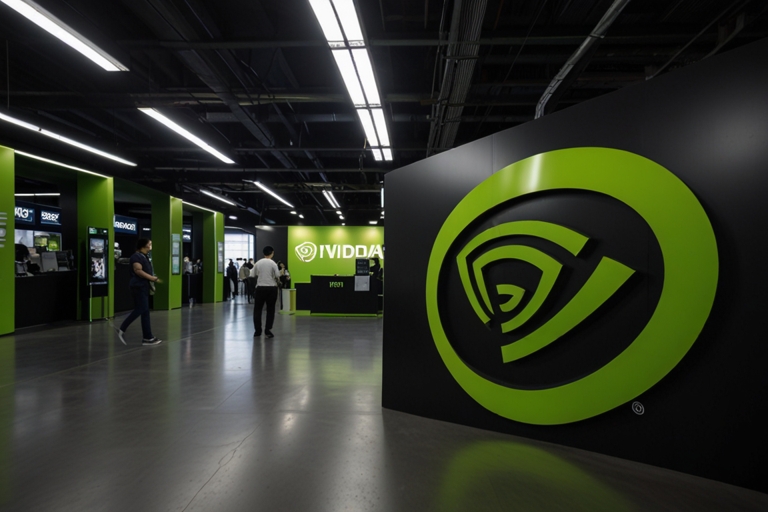
TL;DR
- Nvidia will exclude China from future revenue and profit forecasts, CEO Jensen Huang confirmed.
- The company anticipates no reversal of U.S. AI chip export bans.
- Stricter controls on H20 chip sales could result in an $8 billion Q2 revenue hit.
- Huang referred to policy reversal as a “bonus,” not a planning assumption.
- Nvidia aims to grow through AI demand in Western-aligned nations.
Nvidia Excludes China from Financial Forecasts Amid Policy Pressure
Nvidia, the world’s dominant AI chipmaker, has formally removed China from its revenue and profit forecasts, as U.S. export restrictions continue to block shipments of advanced semiconductors to the region. CEO Jensen Huang revealed the move in a CNN interview, signaling a strategic pivot away from dependence on the Chinese market.
“If [the ban] lifts, it’s a bonus,” Huang said. “But we’re not counting on it.”
The decision reflects Nvidia’s belief that bipartisan U.S. policy on export restrictions is likely to remain unchanged regardless of who wins the 2024 presidential election.
H20 Chips Face New Licensing Barriers
The immediate trigger behind this strategic shift was the Biden administration’s expansion of earlier Trump-era export controls. In April, the U.S. government imposed licensing rules on Nvidia’s H20 chips, a key product developed to comply with prior restrictions but now effectively caught in the same regulatory dragnet.
These restrictions significantly hinder Nvidia’s ability to serve China-based customers, especially in sectors such as AI research, finance, and manufacturing.
The Data
| Key Developments | Details |
| Market Exclusion | China removed from Nvidia’s forecasts |
| Chip Impacted | Nvidia H20 AI chip |
| Policy Driver | U.S. export control restrictions |
| Q2 Revenue Impact | $8 billion loss projected |
| CEO Stance | “Reversal would be a bonus” – Jensen Huang |
Nvidia Accepts the $8 Billion Hit
While Nvidia expects to lose up to $8 billion in revenue in Q2 2025, the company views this as a manageable cost of long-term strategic clarity. Huang’s remarks indicate that Nvidia prefers stability in planning over speculative optimism about shifting U.S. policy.
Wall Street appears to agree. Despite the forecasted drop, Nvidia’s stock has remained relatively stable, as investors focus on the company’s growth in Western markets and its integration into government-led AI initiatives in the U.S. and Europe.
Refocusing Beyond China’s Unpredictable Tech Climate
Once accounting for 25% of Nvidia’s data center sales, the Chinese market has now become a regulatory minefield. In response, Nvidia is investing in partnerships and clients in regions less prone to abrupt policy shifts, including Saudi Arabia, India, and the EU.
Analysts from Goldman Sachs and Morgan Stanley note that this will likely reduce short-term upside but strengthen Nvidia’s resilience to geopolitical turbulence.
No Change Expected After U.S. Election
Even though the chip restrictions originated under the Trump administration, Nvidia does not foresee significant policy reversal under either political party. According to a Reuters report, the company’s executive leadership believes that U.S. national security concerns over AI leadership will continue to dominate the policy narrative.
“You can’t wait for politics to define your supply chain,” said one senior Nvidia executive.
Geopolitics Has Redefined the AI Supply Chain
Nvidia’s repositioning reflects a growing global realization that AI innovation is now inseparable from national sovereignty. For the U.S., the chip export bans are not just trade policy—they are strategic containment mechanisms aimed at slowing China’s military AI capabilities.
In this environment, Nvidia is doubling down on alliances with U.S.-aligned nations and public sector clients. It is also expanding its foundry diversification strategy, working with firms like TSMC, Samsung, and Intel to reduce fabrication risk.
The New AI Frontier: Stability Over Scale
For Nvidia and the semiconductor industry at large, this moment marks a recalibration of the global growth map. While China remains a massive market, the risks associated with regulatory uncertainty and potential nationalization have made it a non-core market for future planning.
Firms like AMD, Qualcomm, and Broadcom may soon follow Nvidia in formally separating their financial outlooks from the Chinese market. This could also accelerate the trend of AI chip specialization tailored for Western military, healthcare, and financial services needs.






